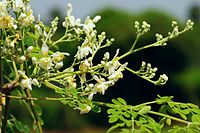
Photo from wikipedia
Low-cost and easily accessible sludge treatment technologies are necessary in low- and middle-income countries. This study aimed to evaluate the use of Moringa oleifera seed powder (MO) as a natural… Click to show full abstract
Low-cost and easily accessible sludge treatment technologies are necessary in low- and middle-income countries. This study aimed to evaluate the use of Moringa oleifera seed powder (MO) as a natural sludge conditioner for supernatant quality improvement prior to thickening as a result of gravity settling. The zone settling rate (ZSR) and sludge volume index (SVI) were used to evaluate the gravity settling capacity. Supernatant clarification was evaluated in terms of the capacity to remove turbidity, apparent colour, Escherichia coli, and organic matter associated with zeta potential evolution. The effects on the values of pH and electrical conductivity were also evaluated. Finally, the effects on the toxicity (chronic and acute) of the supernatant effluent were examined. A significant supernatant quality improvement was observed with the addition of MO. The ZSR (0.16 cm/min) and SVI (53 mL/g) results showed that the sludge had good sedimentability, and the addition of MO maintained these characteristics in a statistical manner. Increasing the MO dosage increased the zeta potential of the supernatant, resulting in an optimal dosage of 1.2 g/L, with a removal of 90% turbidity, 70% apparent colour, 99% E. coli, and 40% organic matter. The pH and electrical conductivity values did not change with increasing MO dosage, which is a competitive advantage of MO addition compared to iron and aluminium salt addition. A reduction in the ability to remove organic matter was observed at higher dosages of the natural coagulant due to the presence of residual MO in the final effluent. The optimal MO dosage of 1.2 g/L did not affect the acute or chronic toxicity of the supernatant. These results emphasized that M. oleifera seed powder can improve the supernatant quality and can potentially be a low-cost and easily accessible conditioner for wastewater sludge thickening.
Journal Title: Sustainability
Year Published: 2023
Link to full text (if available)
Share on Social Media: Sign Up to like & get
recommendations!